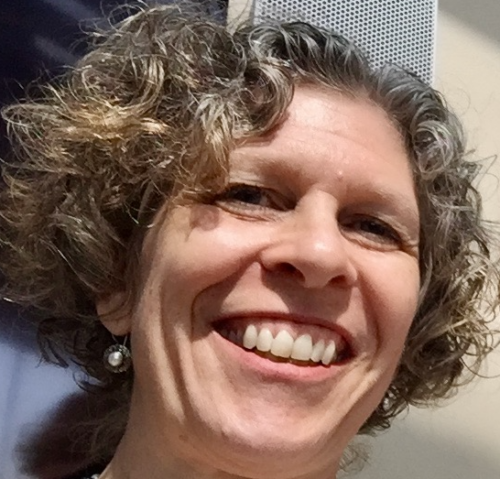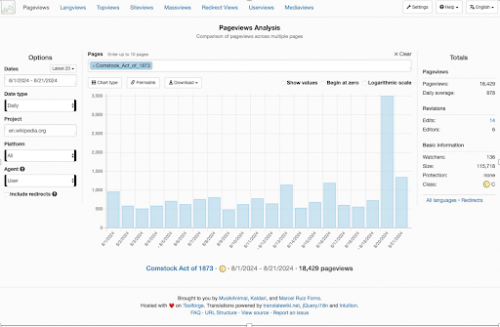In the ever-evolving landscape of information, the need for accurate, well-sourced content has never been more critical, particularly in the midst of this U.S. election year. Fearful of the technical side of editing Wikipedia but motivated to join the fight against misinformation, political scientist Dr. Susan Liebell enrolled in a Wiki Scholars course this spring to bring her nearly 40 years of study to Wikipedia – and hasn’t stopped editing since.
Liebell’s scholarship lies at the intersection of history, politics, law, and philosophy – areas that have sharpened her keen eye for identifying gaps in the information available to the public.
“I had noticed things that were missing on Wikipedia, for example the article on women’s suffrage does not include important material on the contributions of women of color, but I was afraid of the practical, technical side of editing,” said Liebell, a political science professor at Saint Joseph’s University in Philadelphia. “I really did not think it would be so easy – and that was the best part of the course.”
Expressing her gratitude to the Wiki Scholars course, Liebell now compares the simplicity of editing Wikipedia to the ease of sending a text message.
“I learned that it only takes a few minutes to add or correct something – and you don’t need to be a tech genius,” explained Liebell.

From information about Supreme Court cases to 17th century feminist thinkers, Liebell made widespread improvements to Wikipedia across a variety of political science topics, following her interests, areas of expertise, and available resources – and even tackled the example her instructor shared to underscore how some critically important articles can still need serious help: the Comstock Act of 1873 article.
“I had made a very long list of possible articles to work on, but when I saw that the Comstock article was a strange mix of long quotes and did not connect with 21st century politics, I thought it was an easy way to contribute,” said Liebell, noting her excitement to lend her expertise to the article. “I knew a lot about 19th century attitudes towards women in the law and I understood that Comstock was a ‘zombie’ law that some people hoped could criminalize abortion and birth control.”
Just as she approaches her own scholarship, Liebell’s work on Wikipedia often bridges historical context with contemporary life, a link she forged during the course to enhance relevant and critical content for U.S. voters.
“My work is very theoretical and historical – but I always try to connect what I know about the 17th and 18th century to what is happening in today’s world,” noted Liebell, who added information about relevant court cases to several articles, including Mifepristone and Bump stock.
Throughout the course, Liebell also enhanced articles covering legislature (Married Women’s Property Acts in the United States), court cases (Garland v. Cargill), and political figures (Lilly Goren).
“We need all types of people to add what they know about the world,” emphasized Liebell, encouraging other scholars to learn to edit Wikipedia. “I have continued to edit because people who have access to ‘behind-the-paywall’ resources need to share with those who do not. As a university professor, I have access to databases (so I can easily find a quote or a photo out of copyright) and I’ve spent almost 40 years learning to research.”
Liebell continues to draw real-world connections between her experience in the course, her ongoing work to improve election-related content on Wikipedia, and current events.
“As part of our [Wiki Scholars] class, we looked at the number of people who read articles,” said Liebell. “During the Democratic National Convention, one of the speakers mentioned Comstock (because Project 2025 recommends using Comstock to make mailing abortion related material illegal). Because of the course, I know that people will look up terms they don’t know – and it is absolutely true!”

When considering the challenges of her editing experience, Liebell noted the conflicts that can arise between editors when they disagree about exactly what content should be included in an article.
“I saw that Wikipedia is only as good as the editors and we needed more editors to be involved,” Liebell reflected. “Democracy is great until you have two people who disagree and no neutral umpire!”
Motivated by the satisfying moments when she can leverage her expertise and resources to benefit others, Liebell continues to fight misinformation by improving Wikipedia.
“It feels very good to add specific material that is time consuming and tricky to find,” said Liebell. “For example, I read that the Comstock Act was mentioned in Project 2025 but I could not find it when I scanned the 900+ page document. Project 2024 refers to the law but never uses the term. But I read the sections on abortion and added the page reference to the Wikipedia article. That felt good!”
Liebell encourages other scholars to join her in editing Wikipedia, underscoring her hope that academic associations establish a way to credit this impactful knowledge equity work.
Interested in learning how to add your own expertise to Wikipedia? Explore Wiki Education’s upcoming courses for subject-area experts.
Looking to empower your students by incorporating a Wikipedia assignment into your course? Visit teach.wikiedu.org to learn more about the free resources, digital tools, and staff support that Wiki Education offers to postsecondary instructors in the United States and Canada. Apply by December 1, 2024 for priority consideration for spring 2025.
